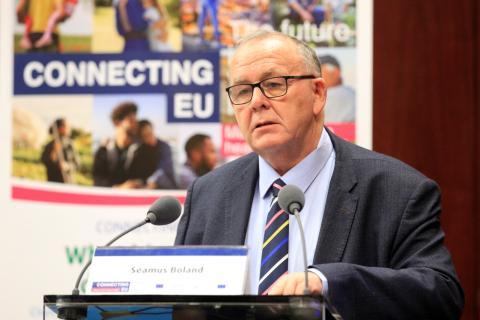European Economic
and Social Committee
Connecting EU seminar 2021 - Speech by President Séamus Boland
Connecting EU seminar 2021 on 'What kind of Europe do you dream of?', panel on 'European democracy: how can we buttress press freedom in Europe against looming multiple threats?'
Lisbon, 19 November 2021
Ladies and gentlemen,
It is great pleasure for me to be among you today, at this conference called 'What kind of Europe do you dream of?'. I find that this is a wonderful title for an event! Very inspiring and optimistic, but also action oriented, which is crucial when we are speaking about democracy and press freedoms. I am reminded of a quotation from the State of the Union speech of Ms von der Leyen that I would like to share it with you. I quote: Protecting the rule of law is not just a noble goal…it is also hard work and a constant struggle for improvement…(But) these values are part of our soul, part of what defines us today.
I could not agree more with the EC President and regrettably, in several EU countries, the pandemic was used as an excuse to legitimise further inroads into media freedom. Without doubt, the Covid-19 pandemic taught us three fundamental lessons in relation to democracy. Firstly, it highlighted the importance of press freedom and the rule of law for our democracies, our fundamental rights and our daily lives. Secondly, it revealed that even in the EU, these rights are fragile and should not be taken for granted. Thirdly, it demonstrated beyond doubt, the essential role of CSOs in protecting those values and in finding sustainable solutions.
The reality is that there are very worrying trends in declining media freedoms and in increasing curbs on journalistic independence, even in the EU. Since 2015, 16 journalists have been murdered. This is absolutely shocking and something that I think the vast majority of the EU citizens are not even aware of. It is simply inconceivable that these murders have happened in the EU, with our democratic laws, values and judiciaries. Equally shocking are the increasing verbal and physical threats and attacks to journalists, the online harassment, judicial harassment, arbitrary arrests, illegal surveillance and even sexual harassment.
However, the curbs on media freedoms are not limited to attacks on journalists. Unfortunately, the scope is much wider. We are witnessing an overall restriction to media pluralism and increasing media monopolies, driven by economic interests and increasingly illiberal democracies. And this is happening precisely because in democracies, the media play a key role as a watchdog over the executive, legislative, judiciary and private individuals. Clearly, the media are perceived as threats to established interests.
What is the way forward? I would like to present a few of the recommendations made in the EESC Own-Initiative Opinion 'Securing media freedom and diversity in Europe', adopted last year and for which the rapporteur was Mr Christian Moos, Member of our Diversity Europe Group.
As a starting point, we must agree that that the EU has a moral obligation to enforce EU values and to protect functioning liberal democracies and the rule of law. And perhaps now more than ever, the media sector needs effective assistance from both the European Institutions and civil society.
Hence, there are a number of key recommendations that can be made on protecting journalists, on strengthening media independence and diversity, as well as on improving media literacy among European citizens.
For example, we must put at the top of our agendas and actively support, the EC proposal for a Recommendation on the Safety of Journalists and EC financial support for the legal protection of journalists. Equally high on our agendas must be the EU plans for a European Media Freedom Act. The latter will equip the EC with the necessary legal instruments to enforce media freedom and pluralism in all Member States.
There also need to be EU bans on 'Strategic Lawsuits Against Public Participation', the so called SLAPPs. These aim to censor, intimidate or silence media critics through legal costs or simply fear. SLAPPs have no place in a EU of democratic values and plurality of opinions.
Another recommendation, would be greater EU support for impartial national public broadcasting companies, which provide an indispensable contribution to media plurality. We also need a fully independent European public service broadcaster.
In addition, the EU must incentivise the creation of national transparency registers, for example on contacts between politicians and media entrepreneurs, just like we have European Transparency Register. Finally, it is recommended that future EC annual reports on the Rule of Law in Member States, should automatically include a section on the state of media freedom and plurality.
Ladies and gentlemen, without doubt, there are many other recommendations that could be made. But let us hear from the speakers who are themselves actors in the field. Those who really do risk their lives for democracy.
Perhaps as a closing remark I would like to express two personal aspirations. The first, is that journalism in Europe will come to be valued and supported for what it really is: a public good of inestimable benefit to the health and safety of our societies. The second, is that greater media protection and diversity should become a focus point both of the discussions and the recommendations of the Conference on the Future of Europe. Might I also just play 'devils' advocate' and ask national media outlets to take a much greater interest in the debates on the Conference on the Future of Europe? I think that we dream of the same kind of Europe, so let us join forces today!
Thank you for your attention.
Work organisation
Downloads
-
Speech by Séamus Boland
